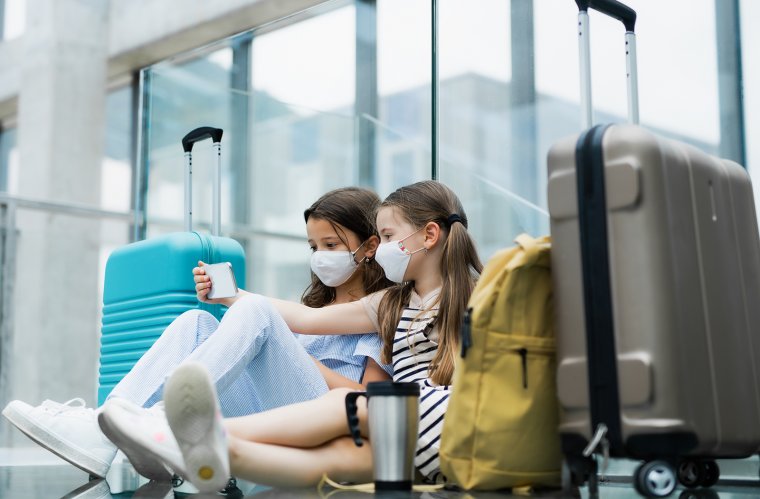
Traveling can be a pain both physically and emotionally, especially if you’re traveling with children. Even if you want to enjoy your vacation, as a parent, you can’t help but think about the possible health risks your child can get. The last thing you want is to be in the middle of nowhere and your child starts to get sick so you need medications for child. To gain rewards on your next medicine, treatment, or vitamin purchase, don’t forget to use your Walgreens cashback.
Table of Contents
Preparation is Key
If you’re traveling with kids for the first time, it’s best to consult your doctor prior to your travel. During that check up, you are able to confirm whether or not your children’s vaccinations are up to date. These include vaccines for mumps, measles, rubella, polio, hepatitis B, tetanus, diphtheria and varicella. Additionally, you may ask your doctor on which medications to bring for the trip. Medications may have varying effects depending on your child’s case, especially if he or she has other illnesses. To know the different benefits and risks of certain drugs particularly for your child, consult your doctor.
Medications to Take While Traveling with a Child
Aside from your child’s current medication, here are some of the medications to take while traveling with a child:
1. Fever and Pain Relievers
Ibuprofen is used to reduce fever and pain such as headaches, toothaches, back pain, and minor injuries. Alternatives to this is Acetaminophen or Paracetamol.
2. Antihistamines
Antihistamines such as Chlorpheniramine, Diphenhydramine, Promethazine and Cetirizine are used for allergies and itching. To avoid a runny nose, itchy eyes and sneezing due to allergies or rashes from insect bites and hives, you should give your child antihistamine.
3. Decongestants
To remedy colds and cough, you should give your child decongestants. Pseudoephedrine, Ephedrine and Phenylephrine are oral medication, while Oxymetazoline or Xylometazoline nasal drops are topical. You may also find saline nasal sprays or ear drops as remedies for congestion and ear infections respectively.
4. Cough medicine
Your child’s cough may be either productive (chesty) or non-productive. There are different medications depending on the kind of cough your child has. Common medications for productive cough are expectorants such as Ammonium Salts, Guaifenesin and Sodium Citrate and mucolytics such as Bromhexine, Ambroxol, Acetylcysteine and Carbocisteine. On the other hand, non-productive cough medications include Pholcodine and Dextromethorphan.
5. Creams and ointments
To further protect cuts, scrapes, wounds, rashes from bug bites and other causes, you may use hydrocortisone creams and ointments. Antibiotic ointments may also be used to further prevent and control infections.
6. Antibiotics
The most common antibiotic prescribed to children is Amoxicillin. This is used for pneumonia, ear infections, sinus infections and the like. Depending on your child’s condition, regular medication may not be sufficient enough. In cases where you will be traveling for a long period of time especially, you should have antibiotics prepared. Although there are antibiotics that can be purchased over the counter, it’s still best to consult your doctor prior to your travel and get a prescription.
7. Medicines for upset stomach
Although there are available medications for diarrhea and constipation, these may not be suited for children. To help with dehydration, Pedialyte is a great option for children to get back electrolytes. I
Tips
-
Bring extras
Bring extras of medications, especially those your child has been currently taking. It’s easy for things to fall out of its container or get misplaced when you’re moving from one place to another. Packing extra medication alleviates that risk and also if your travel gets extended unexpectedly.
-
Familiarize yourself with generic names
If you happen to not have brought enough medication for your trip and need to purchase some while traveling, you should be prepared and know the generic names for the medications. Across different countries, medications may vary. This is not just in terms of its name, but also in terms of its availability. Some countries have drug restrictions and you should be wary of that.
-
Always read the label
As mentioned earlier, different medications have different effects. These also have different instructions depending on the child’s age and weight. Additionally, not all medications are the same. Some may be in forms of syrups or concentrated drops. FOr instance, you have Paracetamol in both syrup and drops. The instructions for medication usage will still differ, even if it’s the “same” medicine. It’s important to note these changes to avoid overdose of medication.
If you choose to re-organize your child’s medication, you should properly label them with its directions and use. That way, during emergencies, you won’t have to think twice whether or not a certain medication is meant for that particular illness.
-
Keep medication at your carry on
As a parent, you should have medications for child readily available especially when traveling. You will never know when your child gets an allergic reaction to something or suddenly gets a fever. It’s best to keep medication accessible and organized. Keeping medication at your carry on also ensures that your child will receive his/her medication during unfortunate events, such as lost suitcases.








